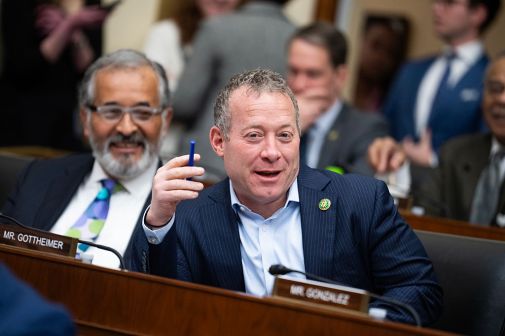House lawmakers release package of bills targeting AI use in robocalls

A trio of House bills introduced this week aim to cement disclosure requirements on artificial intelligence-fueled robocallers and stiffen penalties against those who defy rules against AI impersonations.
Part of a broader package known as the Do Not Disturb Act, Rep. Frank Pallone, D-N.J., ranking member of the House Energy and Commerce Committee and architect of the legislation, said in a statement that the bills are intended to bring “anti-robocall protections into the 21st century and ensures illegal robocallers and scam artists can’t exploit new loopholes even as technology continues to evolve.”
“This comprehensive legislation is long overdue to protect Americans from these annoying calls and texts,” Pallone added, “and I look forward to the hard work ahead to see it across the finish line and signed into law.”
The bipartisan Quashing Unwanted and Interruptive Electronic Telecommunications (QUIET) Act from Reps. Eric Sorensen, D-Ill., and Juan Ciscomani, R-Ariz., would require the person behind a robocall that uses AI to mimic human voices to state at the beginning of those calls and texts that the technology is being used.
Robocallers who use AI to emulate people or entities with the goal of defrauding, causing harm or illegally securing anything of value would be subject to stronger forfeiture penalties and criminal fines. Those measures build on 2019’s Telephone Robocall Abuse Criminal Enforcement and Deterrence (TRACED) Act.
“These scammers are getting better at tricking seniors and working families into handing over billions of dollars in theft and fraud each year,” Sorensen said in a statement. “My QUIET Act cracks down on bad actors using technology to impersonate human voices, so we can better protect our neighbors and loved ones. To keep Americans safe, we need to stay one step ahead of these criminals.”
Ciscomani said that advances in AI have led to robocalls shifting “from an occasional nuisance to a tool utilized by bad actors looking to defraud Arizonans,” adding that the technology has given robocallers “the power to be more deceptive than ever.”
A second bill comes from Rep. Jan Schakowsky, D-Ill., the chief deputy whip and ranking member of the House Innovation, Data, and Commerce Subcommittee. Schakowsky’s Restrictions on Utilizing Realistic Electronic Artificial Language (R U REAL) Act would ask the Federal Trade Commission to amend the Telemarketing Sales Rule to mandate disclosures on AI use in telemarketing, and double the penalties for violations of robocall impersonation rules.
“My bill restricts any telemarketer from using an AI bot that sounds like a human without first telling you that it is AI, and it holds telemarketers accountable for using AI to break the law,” Schakowsky said in a statement. “The dangers of deceptive AI cannot be overstated, [and] we must act now to implement pro-consumer guardrails on this growing industry.”
The third bill, from Rep. Darren Soto, D-Fla., would order the Federal Communications Commission to implement regulations that call on voice service providers to make available robocall-blocking services at no cost to users. If enacted, the Roboblock Act would update the Communications Act of 1934 to empower the FCC to pursue this regulatory agenda.
“There is no reason why Americans should be getting flooded with spam calls and text messages. We must do better to protect them from these bothersome communications,” Soto said in a statement. “As scammers find more ways to circulate these messages, we must get ahead of it and make sure providers offer robocall blocking services as part of the base price.”
Pallone’s push comes amid a flurry of FCC activity surrounding robocalls. The agency in November launched an inquiry into the impact — good and bad — that AI is having on illegal and unsolicited text messages and phone calls. FCC reply comments to the inquiry were due earlier this month.
The FCC also this week revealed coordinated action with the FTC to combat international robocalls, revealing that those efforts resulted “in a decrease in the volume of apparently illegal robocalls reportedly transmitting the networks” of seven gateway providers that previously received warnings from the agencies.






